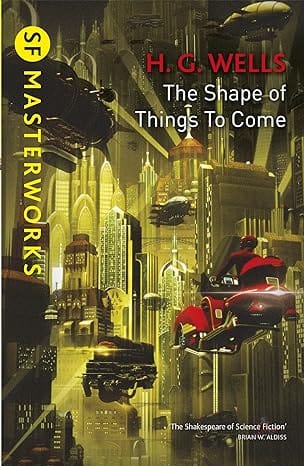The Long View 2009-04-09: Meetings, Bloody Meetings

John's very anodyne title for this blog post doesn't do justice to what he was thinking about here. John was using fiction, in this case mostly H. G. Well's The Shape of Things to Come, as a launching point to consider how the world was likely to change in the next few decades. For example:
There is a fundamental parallel between The Shape of Things to Come and Ayn Rand’s Atlas Shrugged, for instance. Both are about the Revolt of the Elites. In Rand’s case, the elites are entrepreneurs and inventors. For Wells, they were, again, the inventors, but also the technical experts and skilled managers of all descriptions. In both cases, the elites withdraw their support from an increasingly intolerable order of things and gradually organize to replace it with one in which democracy can no longer threaten public order. For Rand, the new utopia is founded (or apparently will be founded) on private property, while Wells makes private property a vestigial institution. In both cases, it seems, the state as such is eventually abolished, or nearly so.

Meetings, Bloody Meetings
Speculative fiction about the future turns into alternative history if you wait long enough. As more than one commentator has pointed out, that is true of no book more than of H.G. Wells’ The Shape of Things to Come, published at the depth of the Depression in 1933. (Note that the link takes you to the full text, legally online.) [John's link is broken BIE] The book is particularly interesting because Wells gave the book the form of a history text with a seamless transition from history to speculation. Among the last bits of real history he discusses is the London Economic Conference of 1933. That gathering has been mentioned in pretty much every historical background piece on this week’s G20 meeting in England, usually to the disparagement of the former and the mild praise of the latter.
* * *
We may note that US President Franklin Delano Roosevelt did not attend that earlier multilateral summit in person. Actually, at some points he even declared that the American delegation would not participate in the negotiations, or in some of the negotiations. Nonetheless, Wells was apparently expressing a widely shared opinion when he wrote that the conference would be FDR’s or no one’s. Famously, it turned out to be no one’s. It reached no important agreement on any subject and implicitly invited the world’s business communities (definitely plural then) that their only recourse was to beggar their neighbors by seeking tariff and currency protection.
Wells’ remarks about the expectations for Roosevelt inevitably give rise to searches for comparisons with the current situation:
Primarily the London Conference was a belated effort to repair the vast omissions of that earlier gathering [at Versailles], to supplement the well-meaning political patchwork of Wilson by some readjustment of the monetary and economic dislocations he had been too limited to foresee or too weak to avoid. Wraithlike conceptions of some vague monetary League of Nations at Bâle, and some Tariff Council and Assembly, drifted through the mists of the opening meeting. And History, with its disposition to inexact repetition made one of the principal figures of this second world assembly also a President of the United States, belonging also to the Democratic Party and according to the ritual of that Party invoking the name of Jefferson as the Communists invoked the name of Marx or the Moslim, Mahomet. This was Roosevelt II. He leaves a less vivid impression than his predecessor because he did not impend for so long upon the European scene. But for some months at least before and after his election as American President and the holding of the London Conference there was again a whispering hope in the world that a real “Man” had arisen, who would see simply and clearly, who would speak plainly to all mankind and liberate the world from the dire obsessions and ineptitudes under which it suffered and to which it seemed magically enslaved. But the one thing he failed to do was to speak plainly.
As readers of the book know, the failure of the Conference led to three decades of Very Bad Things, notably an ever deepening global economic contraction, worldwide warfare (if not quite a single world war) by the end of 1940, and then there was that superplague in the 1950s.
The overlay between this history and the actual one is imperfect. Even in the case of the Depression, Wells’ forecast was wildly misleading with regard to Great Britain, where there was persistently high unemployment in the 1930s, but nothing like the intractable stall in the US; over the period 1920-1940, the UK economy actually outperformed the American one. Wells’ speculative scenario remains interesting, however, if for no other reason than that it chimes with other scenarios.
There is a fundamental parallel between The Shape of Things to Come and Ayn Rand’s Atlas Shrugged, for instance. Both are about the Revolt of the Elites. In Rand’s case, the elites are entrepreneurs and inventors. For Wells, they were, again, the inventors, but also the technical experts and skilled managers of all descriptions. In both cases, the elites withdraw their support from an increasingly intolerable order of things and gradually organize to replace it with one in which democracy can no longer threaten public order. For Rand, the new utopia is founded (or apparently will be founded) on private property, while Wells makes private property a vestigial institution. In both cases, it seems, the state as such is eventually abolished, or nearly so.
* * *
As for the G20 conference, every-one says that it went splendidly. President Medvedev has taken to calling President Obama “comrade.” The Queen liked the Obamas well enough not to set the corgis on them. Prime Minister Brown called the event the beginning of a New World Order. (He will get letters about that; lots and lots, if the elder President Bush’s experience is any guide.) Obama and Chinese President Hu seem to have actually had some substantive discussions, but aside from that, there is a vaporware quality to the actual output of the conference. A trillion-plus dollars were re-promised or not-quite-promised for the IMF, while the major national regulatory authorities undertook to coordinate their regulation of risk-shifting mechanisms, such as hedge funds and derivatives. There is a great dearth of serious new international institutions among the conference’s accomplishments, however.
Institutions are not everything. The conference by no means seeks to limit globalization, but it does switch the defaults about the attitudes of governments everywhere toward financial activity. In the 1990s, the consensus was that the purpose of regulation was to facilitate commerce; the consensus now is that some kinds of commerce need to be stopped or fundamentally modified. The definition of “best practices” has changed.
As for the cloud of amity that enveloped southern England these past few days, it is in the nature of such things to condense into a much simpler precipitation. Certainly today’s world is unlike the world of 1933, when there was a small class of Great Powers with zero-sum antagonisms toward each other. However, the world is not really multipolar, and if it were, it would not have 20 poles, or even 7. By and by this will become apparent.
Not just the Washington Consensus of the 1990s is breaking up, but the post-World War II world system for which the Washington Consensus was a sort of afterlife. The process is kicking up a lot of dust. And yes, such transformations can occasion several decades of Very Bad Things.




Comments ()